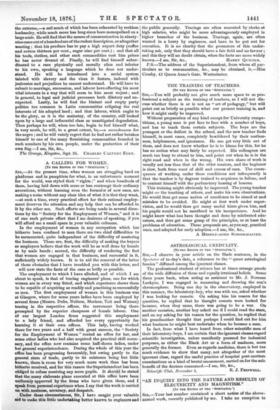THE TRAINING OF TEACHERS.
[To THE EDITOR OF THE "SPECTATOR."] Srn,—You will probably not give much more space to so pro- fessional a subject as the training of teachers, so I will not dis- cuss whether there is or is not an "art of pedagogy," but will point out as briefly as possible what our present training is, and how it might easily be improved.
Without preparation of any kind except for University compe- titions, a young man is put face to face with a number of boys, and has to teach them certain subjects. The boys are the youngest or the dullest in the school, and the new teacher finds himself, in most cases, completely bewildered by their restless- ness, helplessness, and ignorance. He can get very little out of them, and does not know whether he is to blame for this, for he has no notion what may fairly be expected. His colleagues are much too busy to attend to him, and point out when he is in the right road and when in the wrong. His own share of work is usually not less than that of the older masters, and the beginner is slow, both from want of skill and excess of care. The conse- quence of working under these conditions not infrequently is that the teacher is by degrees trained to acquiesce in failure, and to content himself with the perfunctory hearing of lessons.
This training might obviously be improved. The young teacher might see the teaching of others, and make his own observations. He would thus get some notion of excellence to be aimed at and mistakes to be avoided. He might at first work under super- vision, and he would thus get many useful hints given him, and his pupils would not be sacrificed to his inexperience. And he might know what has been thought and done by celebrated edu- cators, and thus get some grasp of the principles, or at least the problems of education. These proposals are, as you say, practical ones, and adapted for early adoption.—I am, Sir, &c.,
A MIDDLE-AGED SCHOOLMASTER.






































 Previous page
Previous page